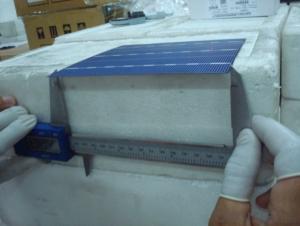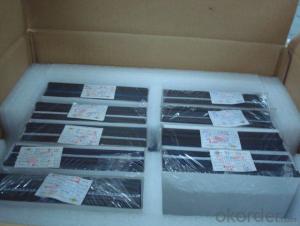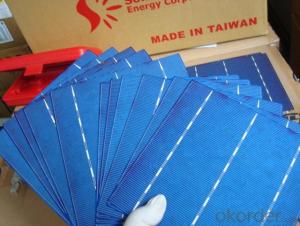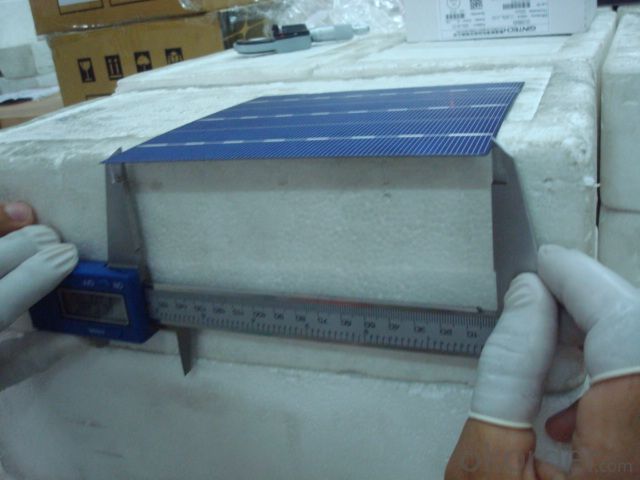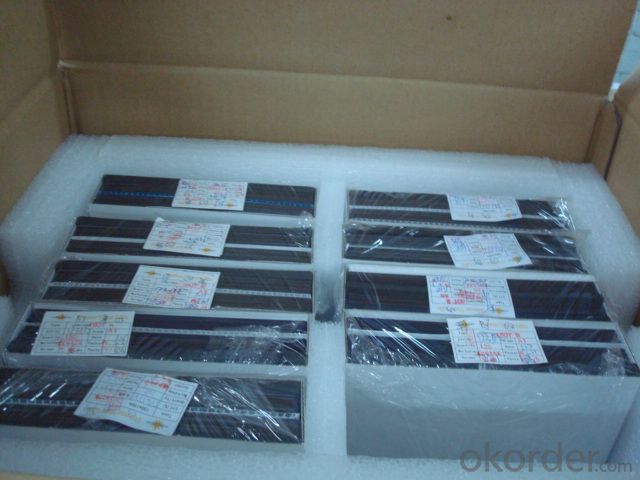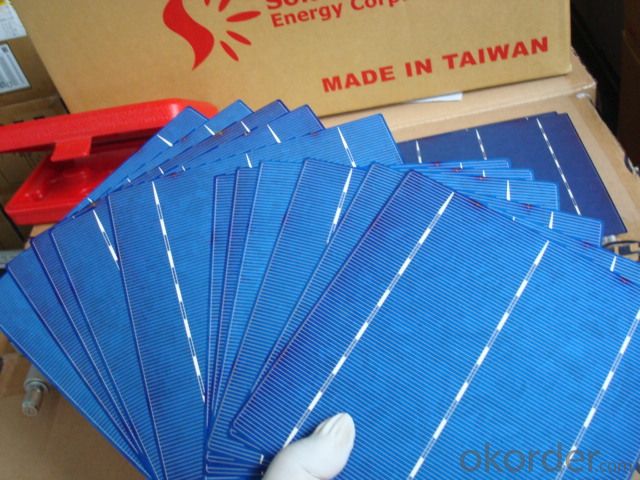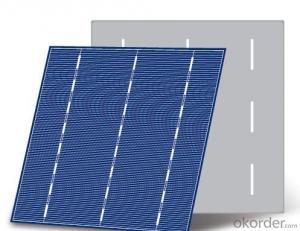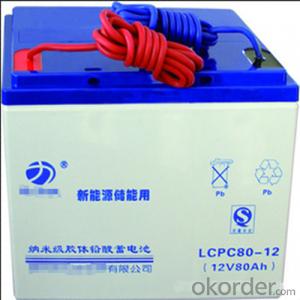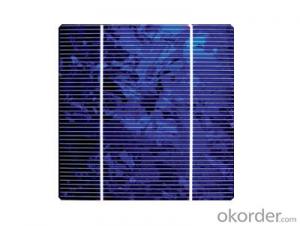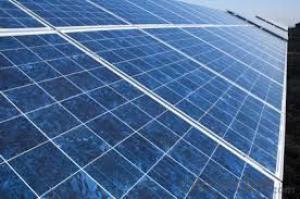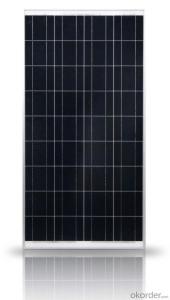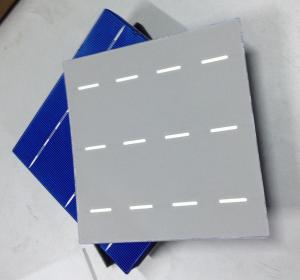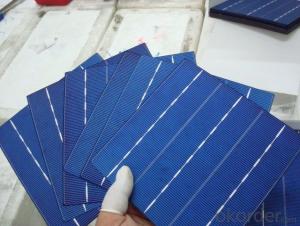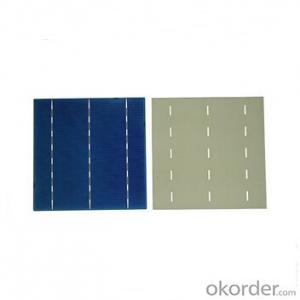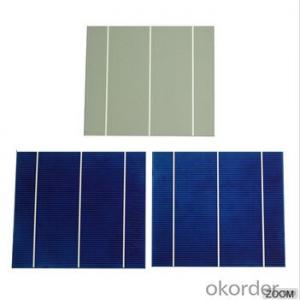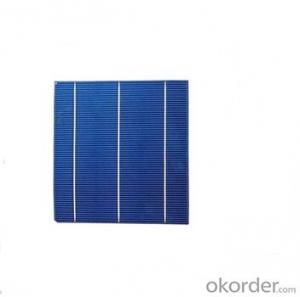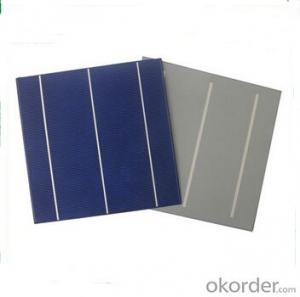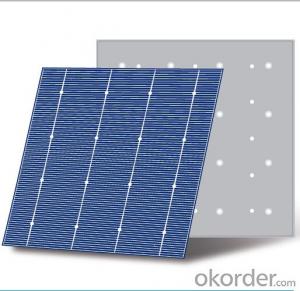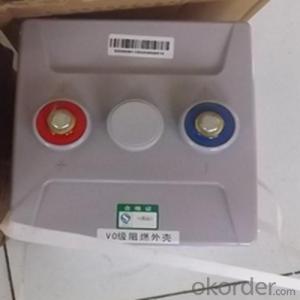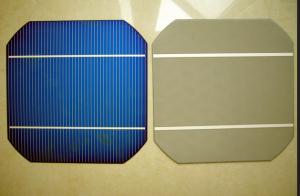Cheap Solar Cells for Sale - Polycrystalline Solar Cells Tyre 1 Manufacturer Effy 16.4%
- Loading Port:
- Shanghai
- Payment Terms:
- TT OR LC
- Min Order Qty:
- 10000 pc
- Supply Capability:
- 50000000 pc/month
OKorder Service Pledge
OKorder Financial Service
You Might Also Like
Brief Introduction of Solar Cells
A solar cell, is an electrical device that converts the energy of light directly into electricity by the photovoltaic effect, which is a physical and chemical phenomenon. It is a form of photoelectric cell, defined as a device whose electrical characteristics, such as current, voltage, or resistance, vary when exposed to light. Solar cells are the building blocks of photovoltaic modules, otherwise known as solar panels.
Specifications of Polycrystalline Solar Cells
Format : 156 mm × 156 mm ± 0.5 mm
Thickness: 210 μm ±40 μm
Front (-) : 1.5mm bus bars (silver),blue anti-reflection coating (silicon nitride)
Back (+) : 2.5mm wide soldering pads (silver) back surface field (aluminium)
Efficiency (%) | Pmpp (W) | Umpp (V) | Impp (A) | Voc (V) | Isc (A) |
18.00% | 4.38 | 0.528 | 8.291 | 0.631 | 8.869 |
17.80% | 4.33 | 0.525 | 8.252 | 0.629 | 8.821 |
17.60% | 4.29 | 0.532 | 8.053 | 0.633 | 8.541 |
17.40% | 4.23 | 0.528 | 8.092 | 0.624 | 8.632 |
17.20% | 4.19 | 0.524 | 7.992 | 0.62 | 8.458 |
17.00% | 4.14 | 0.52 | 7.972 | 0.623 | 8.5 |
Advantage of Polycrystalline Solar Cells
1. Tire-1 Solar Cells’ Manufacturer Quality Guarantee. With a complete and sophisticated quality government system, our Quality Management have arrived world’s leading place. Customer can receive Tire-1 Cells Maker’s Quality Standard Products.
2. Trusted Warranty. We supply good after-sales to our customers. Any defects which is not comply with our quality standard, can be claimed by our customers.
3. World wide market: Now we have explored wide customer group over the world. Now we have customers in Asia, like India, Philippines, Thailand, Japan. Europe like German, UK, France, Italy etc. And also North and South America are also important area.
4. Stable Supply of Solar Cells. With the capacity of 500MW, we can supply a stable quantity to the world.
Usage of Polycrystalline Solar Cells
Solar cells are often electrically connected and encapsulated as a module. Photovoltaic modules often have a sheet of glass on the front (sun up) side, allowing light to pass while protecting the semiconductor wafers from abrasion and impact due to wind-driven debris, rain, hail, etc. Solar cells are also usually connected in series in modules, creating an additive voltage. Connecting cells in parallel will yield a higher current; our solar cells have passed IEC Certification. With high and stable quality, our cells can greatly improve the performance of Solar Modules.
Applications of Polycrystalline Solar Cells
Assemblies of photovoltaic cells are used to make solar modules which generate electrical power from sunlight, as distinguished from a "solar module" or "solar panel". A solar array generates solar power using solar energy.
Packaging & Delivery of Polycrystalline Solar Cells
Carton Box Package and Deliver by air. It should be noticed that it should be avoid of water, sunshine and moist.
Factory Picture of Solar Cells
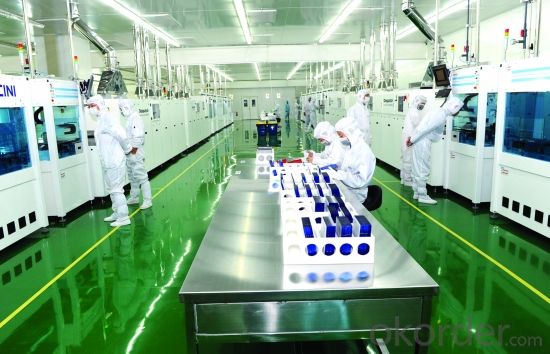
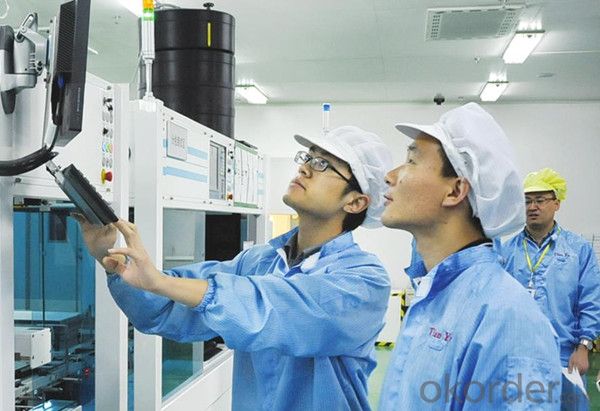
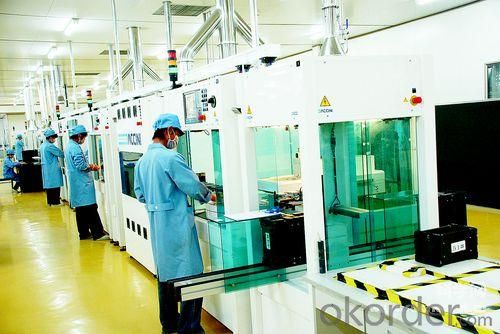
FAQ
We have organized several common questions for our clients,may help you sincerely:
1. What’s price per watt?
A: It’s depends on the quantity, delivery date and payment terms of the order. We can talk further about the detail price issue. Our products is high quality with lower price level.
2. Can you tell me the parameter of your solar cells?
We have different series of cells with different power output, both from c-si to a-si. Please take our specification sheet for your reference.
3. How do you pack your products?
We have rich experience on how to pack the panels to make sure the safety on shipment when it arrives at the destination.
4. Can you do OEM for us?
Yes, we can.
5. How long can we receive the product after purchase?
In the purchase of product within three working days, We will arrange the factory delivery as soon as possible. The perfect time of receiving is related to the state and position of customers. Commonly 7 to 10 working days can be served.
- Q: How are solar cells used in spacecraft?
- Solar cells are used in spacecraft to convert sunlight into electricity, which is then used to power various systems and equipment on board, including communication systems, navigation systems, scientific instruments, and life support systems.
- Q: How do solar cells perform in areas with high levels of humidity?
- Solar cells generally perform slightly less efficiently in areas with high levels of humidity. This is because the moisture in the air can scatter and absorb some of the sunlight before it reaches the solar cell, reducing its overall power output. However, modern solar cell technologies have been developed to minimize this effect and maintain a satisfactory performance even in humid conditions.
- Q: How do solar cells perform in areas with high levels of water pollution?
- Solar cells may be adversely affected in areas with high levels of water pollution. The presence of pollutants, such as chemicals or particles, in the water can reduce the amount of sunlight reaching the solar cells, thereby decreasing their efficiency. Additionally, water pollution can lead to the accumulation of dirt, debris, or algae on the surface of the solar panels, further diminishing their performance. Regular cleaning and maintenance are essential in such areas to ensure optimal functioning of solar cells.
- Q: Can solar cells be used in portable devices?
- Yes, solar cells can be used in portable devices. They can convert sunlight into electrical energy, providing a sustainable and renewable power source for various portable devices such as smartphones, tablets, and even small appliances.
- Q: What is the impact of tree shading on solar cell efficiency?
- Tree shading can significantly reduce solar cell efficiency as it blocks sunlight from reaching the surface of the cells. This shading creates patches of shade on the solar panels, reducing the overall output of electricity. It is important to ensure that solar panels are installed in areas with minimal shading to maximize their efficiency and energy generation.
- Q: What is the pollution of solar cells?
- cadmium mercury and other substances), zinc barrels if there is a paste in general electrolyte, its composition is mainly ammonium chloride and manganese dioxide, the middle of a carbon rod, the entire battery with asphalt seal cover, so that the battery Ingredients do not leak out. From this analysis we can see that the chemical battery mainly contains mercury, cadmium, lead, nickel, zinc, copper and so on heavy metals. As we all know, these heavy metals are harmful to the human body, such as: mercury: mercury can make the human body loose teeth, hair loss, finger jitter, nerve disorder
- Q: How do solar cells perform in areas with limited sunlight?
- Solar cells perform less efficiently in areas with limited sunlight compared to areas with abundant sunlight. This is because solar cells rely on sunlight to generate electricity, and limited sunlight means less energy available for conversion. However, solar cells can still produce electricity in areas with limited sunlight, although at a lower rate, making it important to consider alternative energy sources or optimize the solar cell system's design for maximum efficiency in such areas.
- Q: What is the environmental impact of solar cell production?
- The environmental impact of solar cell production is relatively low compared to other forms of energy production. The manufacturing process of solar cells does generate some greenhouse gas emissions and other pollutants, but these emissions are significantly lower compared to traditional fossil fuel-based energy sources. Additionally, the use of solar energy helps reduce carbon dioxide emissions and dependence on fossil fuels, thereby mitigating climate change and promoting a cleaner and more sustainable future.
- Q: Can solar cells be used in charging electric bikes?
- Yes, solar cells can be used to charge electric bikes. Solar panels can generate electricity from sunlight, which can then be converted and stored in the electric bike's battery for later use. This allows for a sustainable and renewable source of energy to power electric bikes.
- Q: Can solar cells be used to power remote oil and gas monitoring systems?
- Yes, solar cells can be used to power remote oil and gas monitoring systems. Solar cells convert sunlight into electrical energy, which can be stored in batteries or used directly to power monitoring systems. This renewable energy source provides a reliable and sustainable solution for remote locations where traditional power infrastructure may be unavailable or costly to install.
Send your message to us
Cheap Solar Cells for Sale - Polycrystalline Solar Cells Tyre 1 Manufacturer Effy 16.4%
- Loading Port:
- Shanghai
- Payment Terms:
- TT OR LC
- Min Order Qty:
- 10000 pc
- Supply Capability:
- 50000000 pc/month
OKorder Service Pledge
OKorder Financial Service
Similar products
Hot products
Hot Searches
Related keywords
